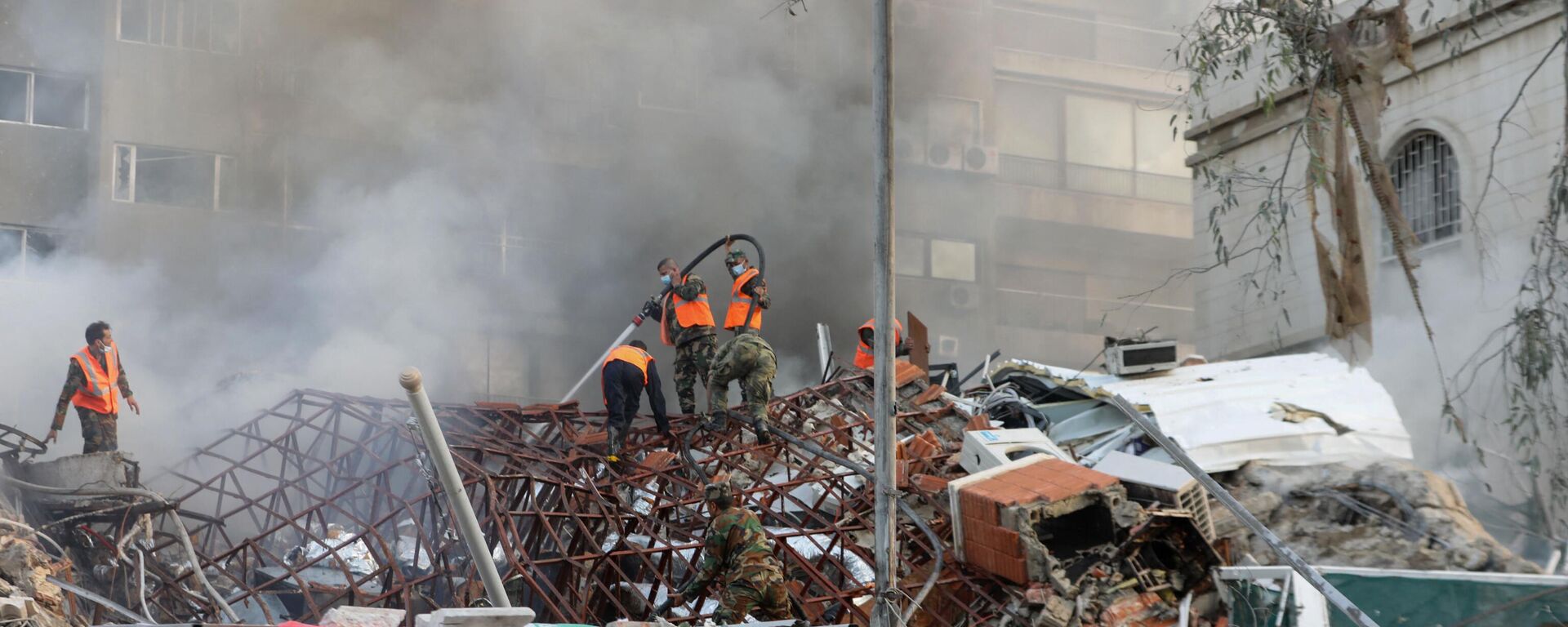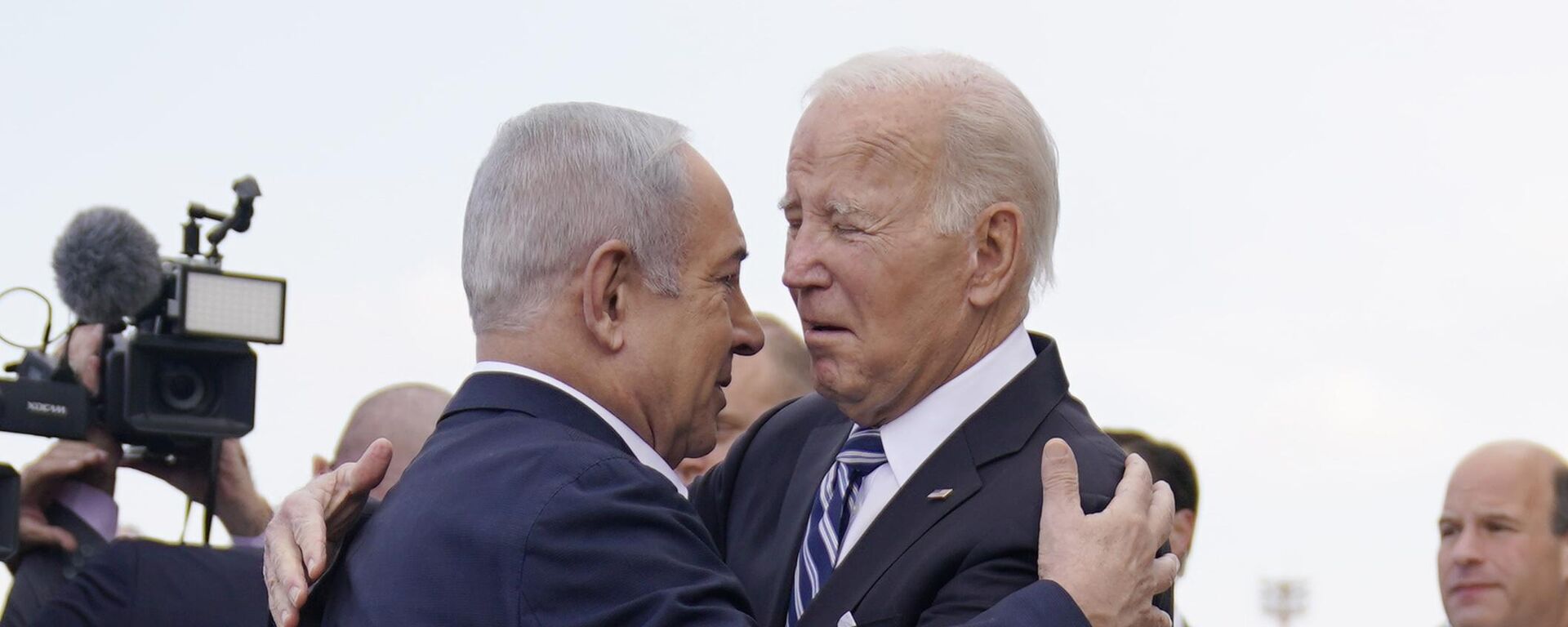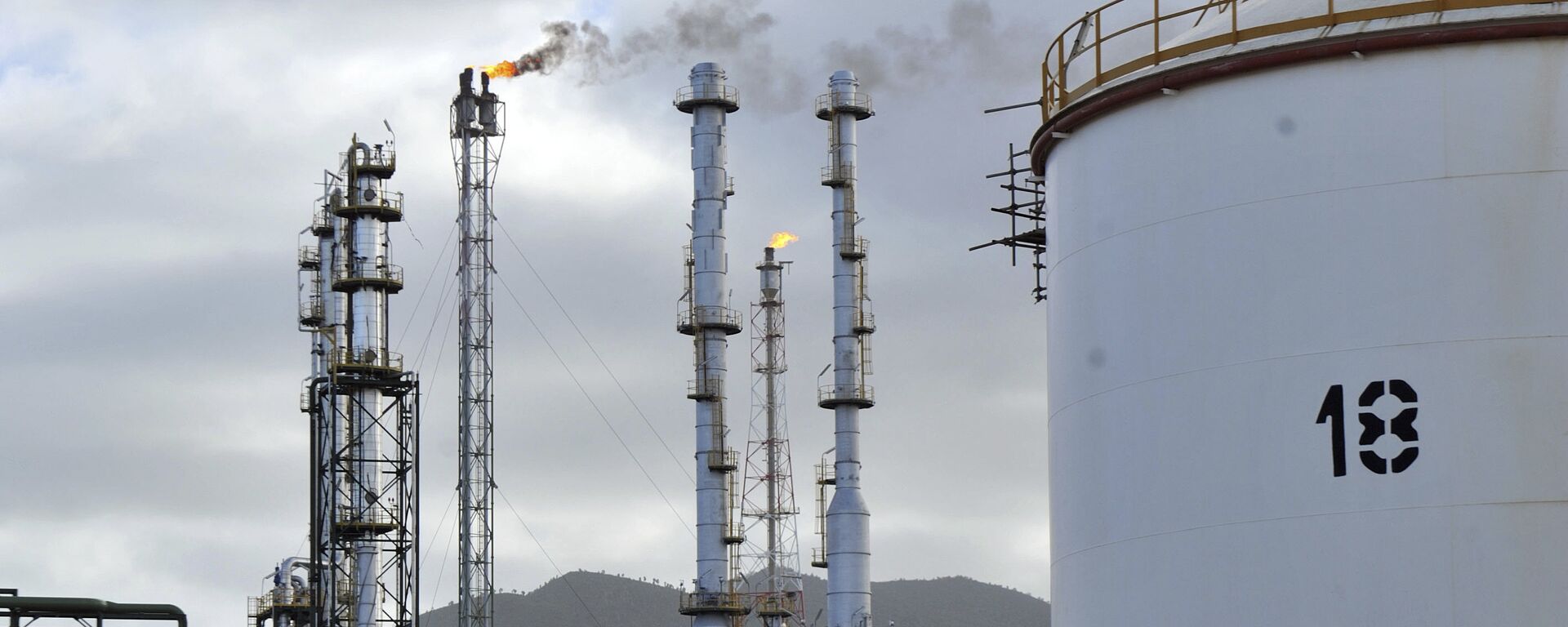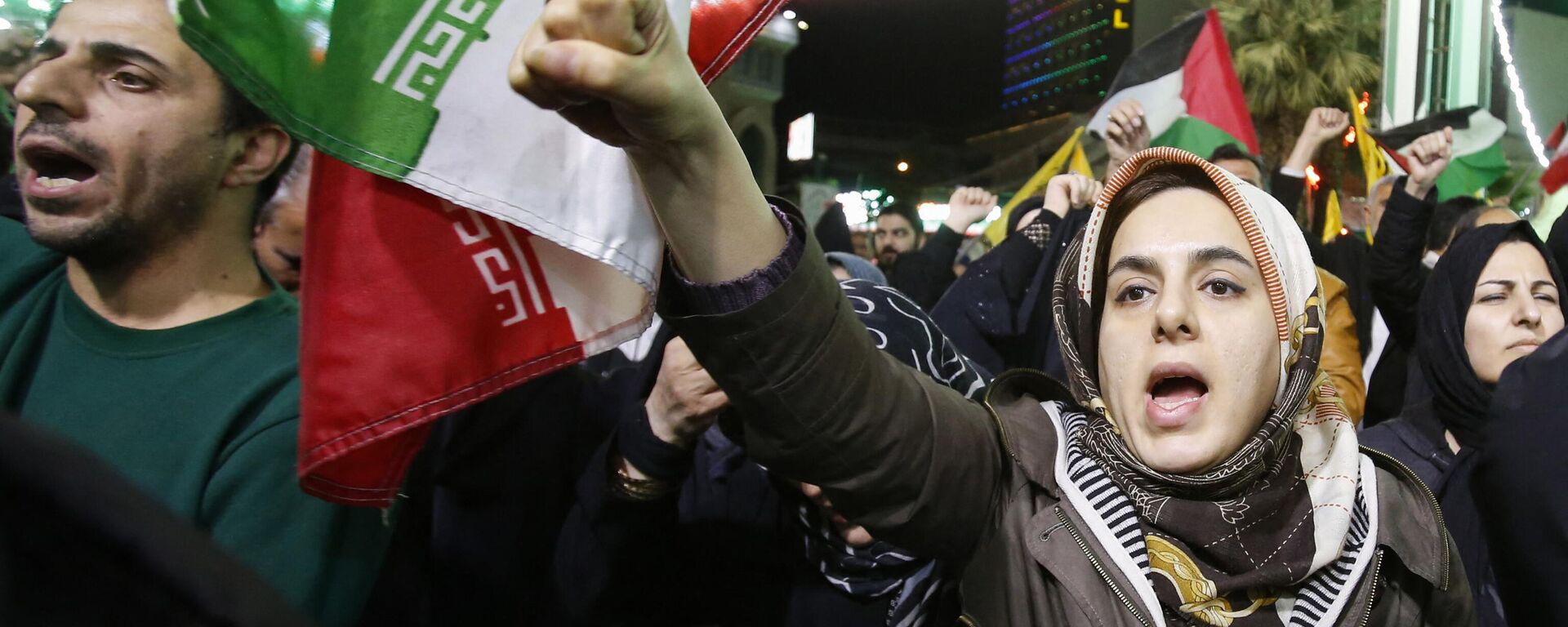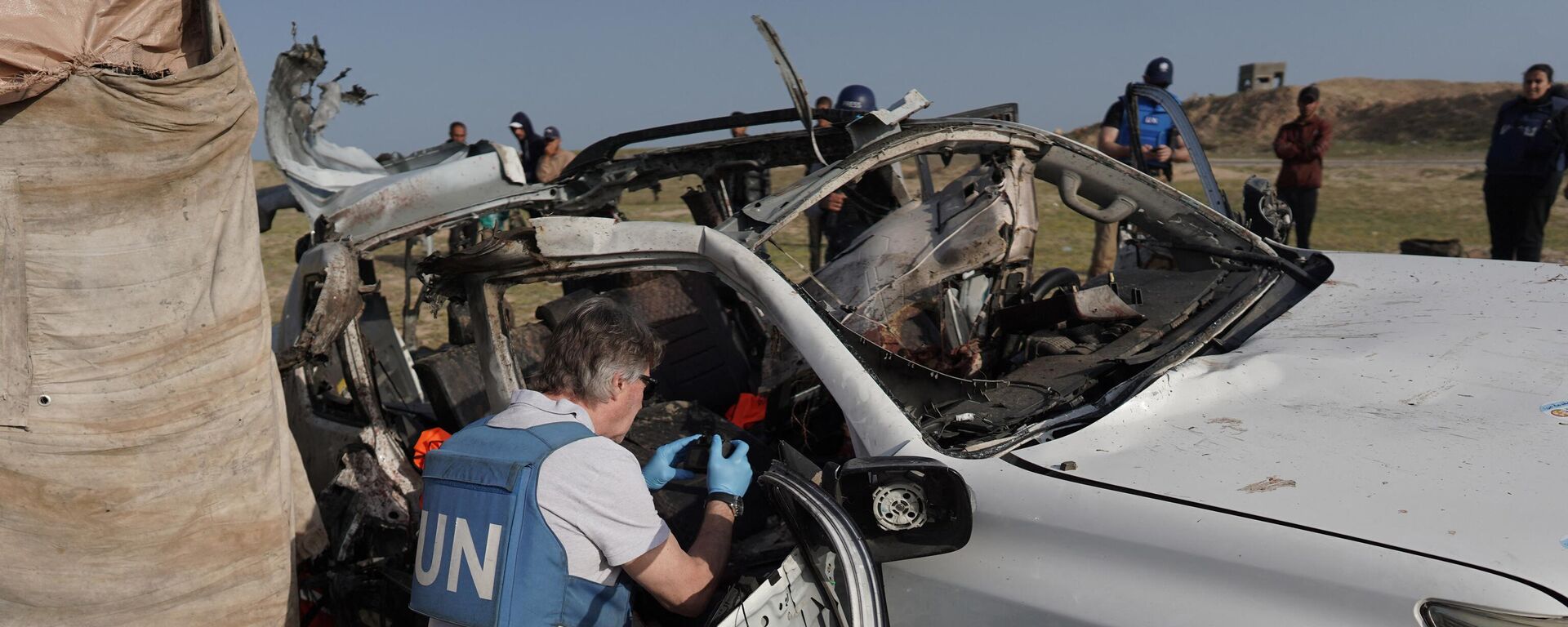https://sputnikglobe.com/20240404/how-israel-iran-conflict-could-shatter-world-economy-1117742951.html
How Israel-Iran Conflict Could Shatter World Economy
How Israel-Iran Conflict Could Shatter World Economy
Sputnik International
The April 1 attack on the Iranian embassy in Damascus, believed to be carried out by Israel, is widely seen as a major escalation. What if a war between Iran and Israel breaks out?
2024-04-04T18:08+0000
2024-04-04T18:08+0000
2024-04-13T12:09+0000
middle east
opinion
iran
israel
damascus
israel defense forces (idf)
ebrahim raisi
oil prices
world economy
inflation
https://cdn1.img.sputnikglobe.com/img/07e7/0b/02/1114668613_0:0:1023:575_1920x0_80_0_0_43492277b5f6ab32321beebaedc06ca6.jpg
Further escalation of tensions between Iran and Israel is fraught with a risk of a large-scale regional conflict which will immediately backfire on the already fragile world economy, Sputnik's pundits say.Oil MarketThe Iran-Israeli hostilities could have a huge impact on the oil market to begin with, according to Marc Ayoub, a Lebanese energy policy researcher and non-resident fellow at the Tahir Institute for Middle East Policy.Ayoub drew attention to the fact that crude prices have been climbing up even before Iran's possible response to Israel over the killing of its elite officers. Immediately after the attack, Brent crude prices rose 1.03 percent to $87.90, while West Texas Intermediate (WTI) soared by 1.45 percent to $84.38. All in all, oil prices have already jumped more than 10 percent this year.A spike in hostilities between Iran and Israel could also have geopolitical consequences, affecting their neighbors, including Egypt, Turkiye, Jordan, Syria, Iraq and Lebanon, according to Rodney Shakespeare, visiting professor of binary economics at Trisakti University in Jakarta, Indonesia, and co-founder of the Global Justice Movement.Financial OrderGiven the scale of tensions and significance of the region to the global economy, a series of negative consequences could shatter the established financial order, the academic warned.He added that a sanctioned Russia which has been "forced" by the West to become financially independent would evade the perfect storm.Risk of EscalationIt was reported on April 4, that the Israeli Defense Forces (IDF) has temporarily halted leave for all combat units in the country. Aharon Haliva, the head of the IDF's Military Intelligence Directorate, warned about a potential threat of strikes from Iran in the coming days. Earlier, on April 3, the IDF announced it would use Israeli reservists to bolster the Air Force's air defense array, the Jerusalem Post reported.The warning came in the wake of the air strike on the Iranian embassy in the Syrian capital on April 1, which killed 12 people. They included General Mohammad Reza Zahedi, a commander of the Quds Force, elite wing of Iran's Islamic Revolutionary Guard Corps (IRGC), his deputy General Mohammad Hadi Hajriahimi and five other officers. Iran sees the strike on its embassy as an attack on its sovereign territory in accordance with international law.Although Israel officially denies responsibility for the attack, in private the nation's officials left little doubt about their role, according to The Economist. In an apparent bid to justify the strike, IDF spokesperson Rear Admiral Daniel Hagari claimed to CNN that the embassy premises were in fact military facilities. "This is no consulate, and this is no embassy," Hagari insisted.Iran’s President Ebrahim Raisi made it clear on April 3 that the Israeli attack "will not remain unanswered."Meanwhile, Washington rushed to distance itself from the Israeli strike on the Iranian embassy in Damascus. Pentagon officials asserted to the press that Israel had not notified them about the attack. "Tensions being high in the region, we wanted to make it very clear in private channels that the US had no involvement in the strike in Damascus," Pentagon spokesperson Sabrina Singh told journalists on April 2. According to the US mainstream media, the Biden administration fears that a series of Israeli military actions in Syria and Gaza could drag Washington further into the Middle Eastern conflict.
https://sputnikglobe.com/20240404/how-iran-can-avoid-falling-into-netanyahus-trap-as-israel-escalates-shadow-war-1117741166.html
https://sputnikglobe.com/20240403/israel-attack-on-iran-embassy-a-message-to-americans-1117725985.html
https://sputnikglobe.com/20240304/algeria-oman-iraq-uae-announce-extension-of-oil-output-cuts-1117117523.html
https://sputnikglobe.com/20240402/iranian-lawmaker-calls-israels-strike-on-consulate-in-damascus-attack-on-irans-territory-1117693824.html
https://sputnikglobe.com/20240403/netanyahu-under-pressure-from-allies-over-israels-deadly-strike-on-gaza-aid-workers-1117711431.html
iran
israel
damascus
Sputnik International
feedback@sputniknews.com
+74956456601
MIA „Rossiya Segodnya“
2024
News
en_EN
Sputnik International
feedback@sputniknews.com
+74956456601
MIA „Rossiya Segodnya“
Sputnik International
feedback@sputniknews.com
+74956456601
MIA „Rossiya Segodnya“
israeli strike on iranian embassy in damascus, israel braces for iran's retaliation, iran-israel conflict will backfire on world economy, oil prices may soar if iran-israel war breaks out, inflation, recession, global economic slowdown, gold prices, iran-israel escalation to trigger regional conflict
israeli strike on iranian embassy in damascus, israel braces for iran's retaliation, iran-israel conflict will backfire on world economy, oil prices may soar if iran-israel war breaks out, inflation, recession, global economic slowdown, gold prices, iran-israel escalation to trigger regional conflict
How Israel-Iran Conflict Could Shatter World Economy
18:08 GMT 04.04.2024 (Updated: 12:09 GMT 13.04.2024) The April 1 attack on the Iranian embassy in Damascus, believed to be carried out by Israel, is widely seen as a major escalation. What if a war between Iran and Israel breaks out?
Further
escalation of tensions between Iran and Israel is fraught with a risk of a large-scale regional conflict which will immediately backfire on the already fragile world economy, Sputnik's pundits say.
The Iran-Israeli hostilities could have a huge impact on the oil market to begin with, according to Marc Ayoub, a Lebanese energy policy researcher and non-resident fellow at the Tahir Institute for Middle East Policy.
"If any escalation happens, it's going to be far worse than what we have seen already from the Red sea tensions, because what happened in the Red sea had minimal impact yet on the oil markets," Ayoub told Sputnik. "And all markets have been so far stabilized. But I think especially if the [straits of] Hormuz enters into the play of the tensions and if Iran gets more power to close the Hormuz canal, then all the Gulf tankers won't have a way forward."
Ayoub drew attention to the fact that crude prices have been climbing up even before Iran's possible response to Israel over the killing of its elite officers. Immediately after the attack, Brent crude prices rose 1.03 percent to $87.90, while West Texas Intermediate (WTI) soared by 1.45 percent to $84.38. All in all, oil prices have already jumped more than 10 percent this year.
"We could really see the barrel price beyond hundred dollars and even reaching something between $140 and $150, based on the previous World Bank and Bloomberg estimations," suggested Ayoub. "This is due to the tensions, but also to the supply chain disruptions, especially if Hormuz is included in addition to the Red Sea. If Iran enters, the Houthis will not stay observers — they will be part of this, and the Red sea will be closed."
A spike in hostilities between Iran and Israel could also have geopolitical consequences, affecting their neighbors, including Egypt, Turkiye, Jordan, Syria, Iraq and Lebanon, according to Rodney Shakespeare, visiting professor of binary economics at Trisakti University in Jakarta, Indonesia, and co-founder of the Global Justice Movement.
Given the scale of tensions and significance of the region to the global economy, a series of negative consequences could shatter the established financial order, the academic warned.
"Because of huge levels of debt – personal, corporation, governmental – a Minsky Moment [a sudden, major collapse of asset values – Sputnik] approaches and huge areas of the global economy will be badly affected," Shakespeare told Sputnik. "Heavily indebted countries (e.g. in Africa) will be ruined."
He added that a sanctioned Russia which has been "forced" by the West to become financially independent would evade the perfect storm.
"Gold will double. Oil will double. Other commodities will have a lesser rise. Governments will be forced to print money and so there will be an inflation of prices; at the same time, demand will lessen," Shakespeare projected.
It was reported on April 4, that the Israeli Defense Forces (IDF) has temporarily halted leave for all combat units in the country. Aharon Haliva, the head of the IDF's Military Intelligence Directorate, warned about
a potential threat of strikes from Iran in the coming days. Earlier, on April 3, the IDF announced it would use Israeli reservists to bolster the Air Force's air defense array, the Jerusalem Post reported.
The warning came in the wake of the air strike on the Iranian embassy in the Syrian capital on April 1, which killed 12 people. They included General Mohammad Reza Zahedi, a commander of the Quds Force, elite wing of Iran's Islamic Revolutionary Guard Corps (IRGC), his deputy General Mohammad Hadi Hajriahimi and five other officers. Iran sees the strike on its embassy as an attack on its sovereign territory in accordance with international law.
Although Israel officially denies responsibility for the attack, in private the nation's officials left little doubt about their role, according to The Economist. In an apparent bid to justify the strike, IDF spokesperson Rear Admiral Daniel Hagari claimed to CNN that the embassy premises were in fact military facilities. "This is no consulate, and this is no embassy," Hagari insisted.
Iran’s President Ebrahim Raisi made it clear on April 3 that
the Israeli attack "will not remain unanswered."International foreign affairs experts are split on what kind of response Iran will resort to: some say that Tehran will respond asymmetrically or capitalize on the Israeli strike to fan the global condemnation of the Netanyahu government's war in Gaza and growing isolation of the Jewish state. Others insist that Iran may be forced to retaliate in order to deter Tel Aviv from further provocations.
Meanwhile, Washington rushed to distance itself from the Israeli strike on the Iranian embassy in Damascus. Pentagon officials asserted to the press that Israel had not notified them about the attack.
"Tensions being high in the region, we wanted to make it very clear in private channels that the US had no involvement in the strike in Damascus," Pentagon spokesperson Sabrina Singh told journalists on April 2. According to the US mainstream media, the Biden administration fears that a series of Israeli military actions in Syria and Gaza could drag Washington further into the Middle Eastern conflict.


